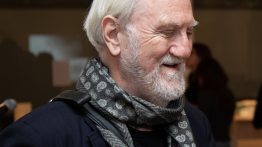In Memoriam: Professor Anthony Vidler
POSTED ON: October 20, 2023

Professor Anthony Vidler, dean of The Irwin S. Chanin School of Architecture from 2001 to 2013, passed away on Thursday, October 19.
Vidler, who moved to New York City from England in the mid-1960s, started his American career at Princeton University teaching art and architecture history while establishing a small consulting practice to assist New York City in repurposing abandoned buildings for use by community organizations, such as drug rehabilitation centers and job training centers. During those first years, he became acquainted with Cooper’s first dean, John Hejduk as well as with the school’s unique approach to architectural education. He served as chair of the art history department at UCLA starting in 1993 but returned to Cooper after Hejduk’s death in 2000 to serve as acting dean and, the following year, as dean. Though many would have been intimidated to follow Hejduk considering his outsized status as pedagogue and architect, Vidler, a scholar of renown, had no fear of comparison.
What he did see as a challenge, though, was introducing digital design tools to Cooper’s curriculum without sacrificing the particularities of the school’s pedagogy and its emphasis on the role of hand drawing and model making. He was surprised to find a dearth of digital tools available at Cooper, which as recalled years later was a little bit of a shock having come from UCLA which, as he put it, "had computers coming out of its ears.”
Furthermore, Vidler took the reins just before the September 11 attacks. Between that and the death of John Hejduk, many at the school were, he said, “in a state of shock.” He strove to cohere faculty around shared pedagogical goals and to understand the changes they felt were in order for a 21st century architectural education. After much listening, he came to the conclusion that Cooper’s architecture school needed to be more fully engaged with New York, less sheltered from the tumult of design and building outside of the academy. He wanted to offer students expanded intellectual opportunities to provide what he called “an education that was important for their future practice”—chances to think about the role of architecture in climate change, threats to civic and cultural stability, and economic justice. “In Tony,” said Acting Dean Hayley Eber, “we found a wholly devoted advocate for the discipline as well as the profession of architecture, an unwavering intellect, and a fervent believer in the potential of architecture to impact culture, society, and the shaping of history.”
In addition to attracting top scholars and practitioners to teach at Cooper, he himself taught 55 different courses at Cooper, including History of Architecture and Introduction of Urban Histories and Theories, as well as seminars that included “Inventing Architectural Modernism, 1945-Present,” “The Critical Edge: Walter Benjamin and the Arts of Modernity,” and “Notebooks: Sketching the City.”
His vast scholarship, dedicated to modern and contemporary architecture and urbanism from the Enlightenment to the present, included more than a dozen books, several about the architect Claude-Nicolas Ledoux. He brought that sense of intellectual inquiry to The Cooper Union through countless lectures, exhibitions, and studio critiques. His publications include The Writing of the Walls: Architectural Theory in the Late Enlightenment; Claude-Nicolas Ledoux: Architecture and Social Reform at the End of the Ancien Regime which received the Henry-Russell Hitchcock Award from the Society of Architectural Historians; The Architectural Uncanny: Essays in the Modern Unhomely; Warped Space: Architecture and Anxiety in Modern Culture; Histories of the Immediate Present: The Invention of Architectural Modernism; James Frazer Stirling: Notes from the Archive; and The Scenes of the Street and other Essays. He was a Fellow of the American Academy of Arts and Sciences and received the architecture award from the American Academy of Arts and Letters in 2011. His scholarship, notes professor and former dean Nader Tehrani, has had far-reaching impact on the field of architecture: “His writing in Oppositions forming a critical foundation for an entire generation, his research transforming our reading of the Enlightenment, and his subsequent books, such as The Architectural Uncanny, revealing a protean capacity to speak across ages and architectural debates.”
Professor Guido Zuliani’s recollections of Vidler reflect those of colleagues across the college. He wrote: “Many will celebrate Tony’s undisputable scholarly achievements that through the years have shaped architectural debates and culture; many will celebrate Tony, especially here at Cooper, for the incredible committed educator that he was. There will be time for all of this and for recognizing his tremendous legacy that survives in the work of many of his students and colleagues. Right now, instead, I cannot but remember and celebrate Tony as a wonderfully generous colleague and friend with whom I have shared an office for about a decade, and who I already deeply miss.”
A native of Essex in the southwest of England, Vidler had exhibited a talent for drawing at a young age, biking through the countryside and sketching what he saw. His father wanted him to pursue a formal profession, so the teenaged Vidler thought architecture could fit the bill. He attended Cambridge for his bachelor’s and architecture degrees, then earned his Ph.D. at Technical University Delft. He lived in New York with his wife Emily Apter, a professor of French and comparative literature at New York University. After stepping down as dean, Vidler continued to offer courses at The Cooper Union while also teaching art history at Brown and Princeton universities.




